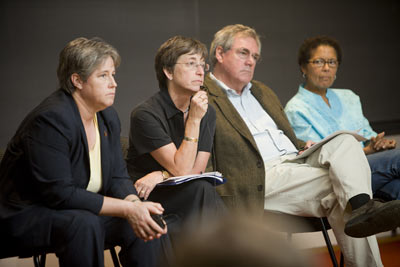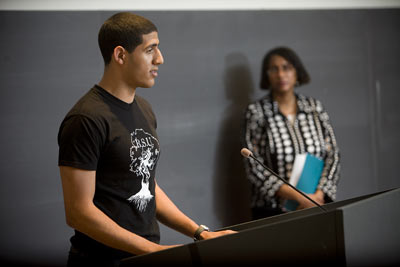Less talk, more action, diversity forum concludes
By Bill Steele



Cornell still has a lot of work to do to become "a place where we all feel respected, safe and included," said Sheri Notaro, associate dean for inclusion and professional development in the Graduate School, in opening a public forum May 9 to discuss concerns stemming from an alleged racially motivated harassment incident the previous weekend. Students and administrators have roundly denounced the incident, and a daylong series of talks on various topics related to diversity and inclusion concluded with the open community forum in Biotech G10.
Notaro moderated a panel consisting of Susan Murphy, vice president for student and academic services; Kent Hubbell, dean of students; Kathy Zoner, chief of Cornell Police; and Renee Alexander, associate dean of students and director of intercultural programs.
Most of the evening was devoted to questions and comments from the audience of nearly 200, mostly students. Black and Asian faces predominated, along with a large group from Sigma Pi fraternity where the recent incident occurred.
As an opening, Karim Abouelnaga '13, a member of the board of Black Students United, read a statement reviewing the incident from the point of view of one of the students involved: As a few black students walked past Sigma Pi at around 2 a.m. Sunday, a bottle thrown from the house's balcony landed near them. One of pedestrians shouted at those on the balcony, "curse words were exchanged," someone upstairs threw an unopened beer can, and the people upstairs referred to "Trayvon," "Gary Coleman" and "Tyrone."
"It was clear that there were extreme levels of hate present," the statement said, noting that it was not just a Greek or Sigma Pi issue, but "a result of deep racial insensitivity and to put it bluntly, ignorance."
Zach Smith '13, president of Sigma Pi, spoke briefly, apologizing for the incident. "We don't condone what went on," he said. "We look forward to being as much help as we can."
Chief Zoner reported that the Ithaca Police Department is still investigating, and not all witnesses have yet been interviewed.
Speakers from the floor, occasionally in voices tinged with anger, expressed a perception that the university was not doing enough to prevent such incidents. "Things like this happen once a year for as long as I can remember," one said. "All I've heard is rhetoric," said another.
Panelists reviewed a variety of initiatives the administration has launched, including the creation of the Cornell Intercultural Center at 626 Thurston Ave. to serve as a home for identity-based organizations and to foster cross-cultural conversations. A continuing question is how to bring people into such conversations, said Murphy. Although Cornell is highly diverse, "If we stop at composition, we are failing ourselves and our educational mission," she said. "We must measure ourselves on matters of inclusion, matters of engagement and matters of achievement."
Hubbell noted that the university has "crossed a threshold," with only 40 percent of students identifying as white. But "Every year a quarter of the population is new," he said. "The first year is a critical transition year when we need to communicate our values."
New students are required to attend "Tapestry," a dramatic presentation followed by moderated discussion about diversity, during orientation. Speakers from the floor suggested that there should be some follow-up. "We can take attendance, but we can't force people to learn," Murphy said.
Alexander said that most white students come from mostly or totally white high schools and communities and have not experienced diversity. "We need white allies," she said. "If we have people of color sitting in the audience, we are preaching to the choir."
Several speakers, including a few faculty members, suggested incorporating diversity issues into academic courses, or even creating a "required course" on the topic. Decisions about course content and requirements are up to the faculty in each college, Murphy noted.
In small breakout groups, minority students reported feelings of discomfort and a desire for others to feel what it was like in their skins.
In a final report from the breakout groups, a woman offered a positive suggestion: "When I see another black person coming down the street, I feel like I should smile at them," she said. "Maybe when you see someone who doesn't look like you, you can smile at them."
Media Contact
Get Cornell news delivered right to your inbox.
Subscribe